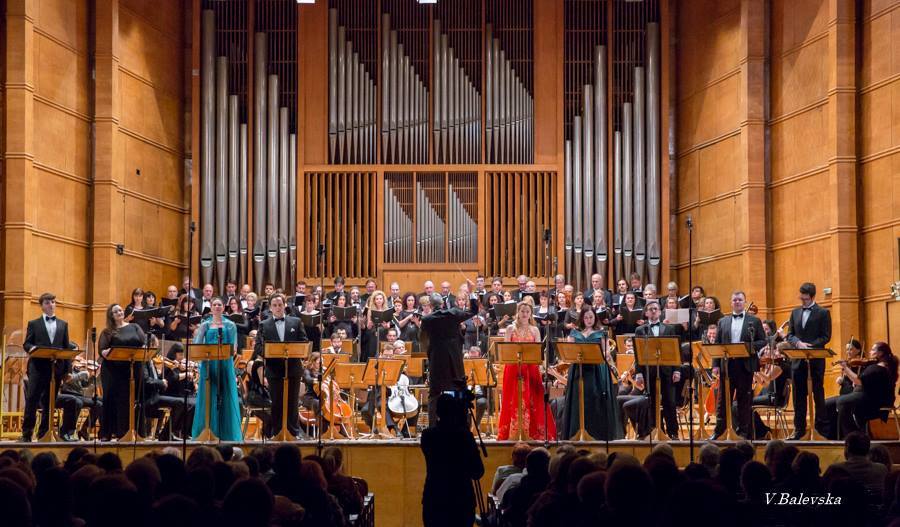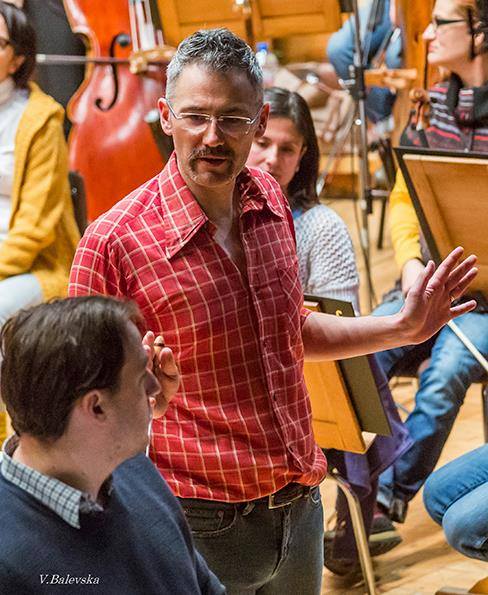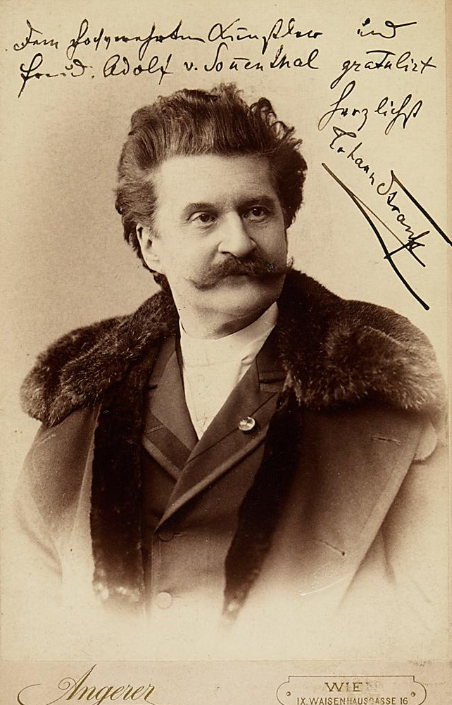Yonel Buldrini
Operetta Research Center
21 February, 2020
“Blindekuh”, literally “blind cow”, is the German term for the “blind man’s buff” game – and it is the title of an operetta by Johann Strauss which was lying in the shadows, before a splendid resurrection at the Philharmonie of Sofia, in January 2019. A resurrection that resulted in a recording and a CD release by the label Naxos.

The concert performance of Strauss’ “Blindekuh” with the Sofia Philharmonic conducted by Dario Salvi. (Photo: V. Balevska / Sofia Philharmonic)
We certainly knew the symphonic pieces that Strauss, as usual, drew from his operettas, including the beautiful waltz Kenn’st du mich? (Do you know me ?). But we knew the melody well before the completion of the complete CD Johann Strauss, because Ralph Benatzky rewrote it for soprano and choir and incorporated in his operetta-pastiche Casanova, under the name Choir of the Nuns, especiallyrecorded by Elisabeth Schwarzkopf and Hilde Güden.
The operetta was premiered on December 18, 1878 at Vienna’s Theater an der Wien, four years after Die Fledermaus (1874), and following two other operettas containing some of Johann Strauss’s finest music: Cagliostro in Wien (Cagliostro in Vienna, 1875) and Prinz Methusalem (Prince Methuselah, 1877).
When one discovers the dazzling melodic vein of Blindekuh, one does not understand the initial failure of the work that must probably be explained by other circumstances than the quality of the music. Indeed, the Viennese newspaper Neue Freie Presse explains the lack of success by the mediocre quality of the booklet, which the music “of a talented artist like Johann Strauss”, also warmly applauded, did not manage to meet.

Conductor Dario Salvi. (Photo: V. Balevska / Sofia Philharmonic)
Nowadays, when one is used to hearing opera without attending a performance, the libretto becomes secondary, and that’s what happened at the Sofia Philharmonic, whose enthusiasm is to be applauded. judicious initiative. A fortiori, the work was performed in concert version and without dialogues. Let’s say from the outset that all singers believe it, with intelligence, malice, finesse and warmth, but the first merit goes to Maestro Dario Salvi, who lovingly lives, vibrates the dazzling music of Johann Strauss, first by knowing how to do it and “breathe” by animating the right tempo, against the current trend to rush, and on the other hand, without ever forcing it either in brilliant or in reverse: restraints, irrelevant nuances. Dario Salvi colors his orchestra with the bright or tender nuances of Johann Strauss, and leads his singers with the abandonment and love that animate his deep belief in this evocative and seductive music : a real happiness for the listener.
Passionate amateurs of Johann Strauss will find with curiosity and pleasure all the detached symphonic pieces, recognizing the patterns, and savoring the Art with which the Grand Viennese has assembled them since their “natural dispersion” in the sung score.
— Blindekuh, overture
— Kennst du mich ?, waltz, Op. 381
— Pariser-Polka, french polka Op. 382
— Nur fort !, quick polka Op. 383
— Opern-Maskenball-Quadrille, Op. 384
— Waldine, polka-mazurka Op. 385
Thus Johann Strauss alternates with an unalterable talent —and for our greatest joy!— captivating waltzes, piquant polkas, delicious mazurkas, and catchy marches like the one that ends the act I. The top of the work is probably the Finale II, when begins the superb waltz with the grave principal motive, already heard at the end of the overture : you hold your breath as the melody captivates, and when the bewitching waltz motif is repeated in chorus on the words “Blindekuh, Blindekuh!”, we soon feel the goosebumps!

The soloists for the “Blindekuh” concert performance recorded by Naxos. (Photo: V. Balevska / Sofia Philharmonic)
Among the many soloists, all up to the challenge, emerges the soprano Martina Bortolotti (Waldine), with a beautiful fruity tone, and forming a nice contrast with the mezzo of Emily Byrne (Fräulein Elvira). Soprano Andrea Chudak serves the role of Betsy, a subtle yet piquant character, with two solo arias. The role of Frau Arabella, wife of Herr Scholler, does not have this opportunity and it is a pity, because we particularly appreciate the rich tone, with the shimmering colors of the soprano Kirsten C. Kunkle, real luxury for the character.

The cover of the 2020 recording of “Blindekuh” on Naxos, conducted by Dario Salvi.
The tenors are numerous, and if James Bowers in Adolf Bothwell, the true nephew of America, is less heard because of his role a little behind, the other three have arias for soloist. Starting with Roman Pichler (Hellmuth Forst), who dominates his tenor colleagues by the importance of his role, and his full-bodied and warm voice stamp.
Julian Rohde fulfills the role of the mischievous butler Johann, to whom his clear voice di grazia goes like a glove… or rather: like the gloves of a butler who respects himself! Daniel Schliewa effectively performs the part of the suspicious official Herr Kragel. Let’s not forget the master of the house, poor Herr Scholle, a little lost in the midst of all these false appearances, to whom bass-baritone Robert Davidson does justice.

A late portrait of Johann Strauss, with his signature. (Photo: Victor Angerer / Theatermuseum Wien)
But, we will not tire of saying it, and one persuades it always more by listening and listening with happiness this recording: a great merit falls to the master of work of the execution, Maestro Dario Salvi, who can infuse all singers of this happy team and each musician of the orchestra, the essence of the Art of Johann Strauss.
Happy with such a brilliant and complete success, public and critical can only wish Maestro Salvi, precisely, to awaken with the same happiness another Sleeping Beauty by Johann Strauss, his last operetta to remain in the shadow: Waldmeister!

It is a pleasure to let you know that Waldmeister was recorded last month!
I listen to some musical excerpts of Waldmeister on the facebook account of Dario Salvi. It took my breath away. A masterpiece restored to it’s full glory. Hope the CD is released in the spring of 2021.
I have order the CD Blindekuh. I have listen excerpts of this operetta. The conducting of Dario Salvi is fantastic. The singers are in top form. The music is breath taking. Full of spirit and energy. After listening to the operetta, it is hard to believe that it was a failure with only 16 performances. Dario Salvi has plans to record the Johann Strauss II operettas, Waldmeister and Indigo. Plus the recording of Ritter Pazman, the only opera by Johann Strauss II. We will be entertained for many years to come.